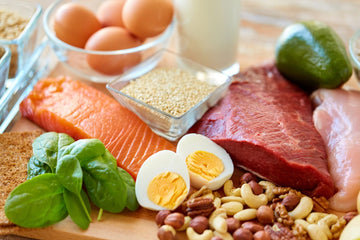Vitamin D3 is a crucial nutrient known for its role in bone health and immune system support. However, getting enough of it through diet alone can be challenging. To help you ensure you’re getting an adequate amount, we’ve compiled a list of the top 10 foods rich in Vitamin D3. These superfoods not only provide Vitamin D3 but also offer other essential nutrients like protein, fiber, and healthy fats. From milk and salmon to eggs and mushrooms, incorporating these foods into your diet can help you maintain optimal levels of this important vitamin. So, don’t stay in the dark – start adding these Vitamin D3-rich foods to your meals today!
What is Vitamin D3?
Vitamin D3, one of two forms of vitamin D, is naturally produced in the body when exposed to sunlight. In contrast, Vitamin D2 is a synthetic form used in some supplements. While Vitamin D3 is present in small amounts in certain foods, it is primarily obtained through sunlight exposure.
This vitamin is crucial for maintaining strong bones, a healthy immune system, and good mental health. Although vitamin D deficiency is rare, it can occur with insufficient sun exposure or certain medications.
Inadequate vitamin D levels may increase the risk of conditions such as osteomalacia, osteoporosis, high blood pressure, and certain cancers.
Vitamin D3 deficiency, symptoms and benefits.
Vitamin D3 deficiency can lead to various symptoms, including fatigue, muscle weakness, and bone issues. It is crucial for building strong and healthy bones, particularly in children and teens. Vitamin D3 also plays a role in mood regulation and can help reduce the risk of depression by aiding in serotonin production.
Vitamin D3 deficiency can cause a variety of symptoms, including:
Fatigue and tiredness: Not getting enough vitamin D3 can make you feel more tired and fatigued than usual.
Muscle weakness: Not getting enough vitamin D3 can make you feel more tired and fatigued than usual.
Bones: Vitamin D3 helps build strong and healthy bones by increasing calcium absorption in the
body. This is especially critical for children and teens as they are still growing. This is especially true for girls at risk of developing osteoporosis in their senior years.
Depression: Research shows that increasing Vitamin D3 in the body can also help improve mood and reduce the risk of depression. Vitamin D3 is also needed to produce serotonin, a hormone that plays a big role in regulating mood.
Impaired wound healing: Vitamin D3 is vital for the recovery of wounds, so a deficiency can slow own the healing process.
Frequent infections: Vitamin D3 helps to boost the immune system, so a deficiency can increase the risk of diseases.
Darker skin: Vitamin D3 deficiency can cause the skin to darken, especially in people with darker skin.
Immune System: Vitamin D3 plays an essential role in immune system function by helping the body fight off infections and diseases. This is especially important for those who suffer from
seasonal allergies, colds, and flu.
Kidney function: According to studies, a deficiency in Vitamin D3 can increase the risk of kidney stones.
It’s important to remember that while Vitamin D3 deficiency can cause these symptoms, other health conditions can also lead to similar deficiencies and symptoms. Therefore, if you’re experiencing any of these symptoms, it’s best to consult a healthcare professional for a proper diagnosis.
If you suspect you have a Vitamin D3 deficiency, it’s recommended to consult a doctor to check your vitamin levels and receive appropriate treatment. This ensures you receive the correct diagnosis and treatment plan for your specific needs.
Now that you know all about Vitamin D3, let’s get into which foods contain Vitamin D3:
1: Salmon is a great source of Vitamin D3, with a 3-ounce serving providing up to 447 IU of the nutrient. In addition to being rich in Vitamin D3, salmon is also packed with omega-3 fatty acids, which are essential for heart health. Including salmon in your diet can not only help boost your Vitamin D3 intake but also support your heart health.

2: Milk is not only a delicious beverage but also a valuable source of Vitamin D3, with a cup containing up to 124 IU of the nutrient. Additionally, milk is an excellent source of calcium, which is essential for maintaining strong bones and teeth. Including milk in your diet can help you meet your Vitamin D3 and calcium needs, supporting overall bone health and strength.

3: Mushrooms, particularly varieties like shiitake and portobello, are not only delicious but also a rich source of Vitamin D3. For example, one cup of sliced portobello mushrooms can provide up to 2,800 IU of Vitamin D3. Incorporating these mushrooms into your diet, whether in salads or sautéed with garlic and oil, can be a tasty way to boost your Vitamin D3 intake.

4: Eggs are a great source of Vitamin D3, with one large egg containing up to 41 IU of the nutrient. In addition to Vitamin D3, eggs are rich in protein and healthy fats, making them a nutritious choice for breakfast or any meal. Including eggs in your diet can help you meet your Vitamin D3 needs while providing your body with essential nutrients.

5: Cod liver oil is the richest source of Vitamin D3, with a tablespoon providing up to 450 IU of the nutrient. Additionally, cod liver oil is a good source of omega-3 fatty acids and Vitamin A. It is easy to incorporate into your diet by taking a daily vitamin or adding it to a smoothie.

6: Fortified yogurt is not only a delicious snack but also a convenient way to boost your Vitamin D3 intake. Many yogurt brands fortify their products with Vitamin D3, providing up to 20% of the daily recommended intake in a single serving. Enjoying fortified yogurt can be a tasty and easy way to ensure you’re meeting your Vitamin D3 needs.

In conclusion, including foods high in Vitamin D3 in your diet is essential for maintaining a healthy lifestyle. Options such as fish, eggs, fortified cereals, and orange juice provide diverse and delicious ways to boost your Vitamin D3 intake. A balanced diet that includes a variety of Vitamin D3-rich foods can support bone health, immune function, and overall well-being.












